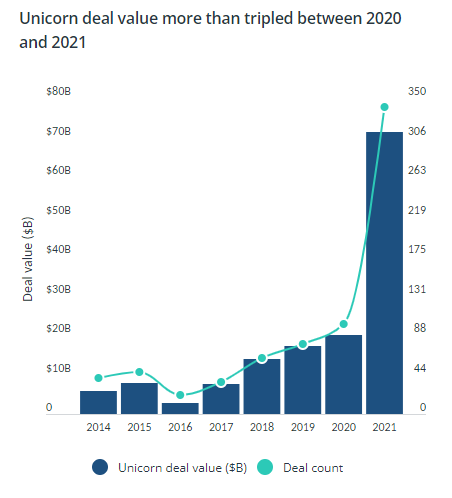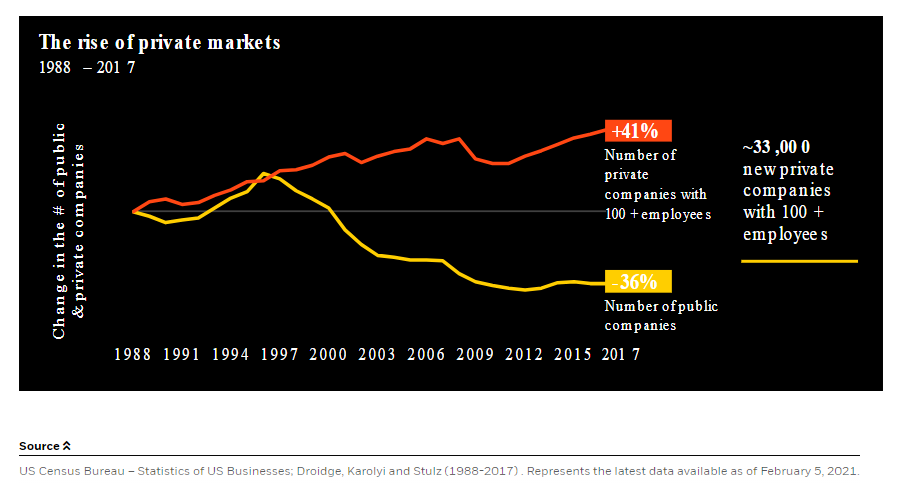Private Markets: What Are They and Why Do They Matter?
By Phil Daniels, CFP®, AIF®
When most people think of investing, they think of public markets – the stock and bond markets we all see discussed on television. However, there is another way to invest that has been around for a much longer time, but only more recently has become more accessible to investors – private markets. Just as a public company’s stock or debt can be invested in, so can the stock or debt of private companies.
In fact, the total value of private companies’ stock is actually greater than the total value of all publicly-traded companies’ stock. This makes sense when you think about it, because private companies consist of every company in the world that is not publicly-traded. Most private companies are much smaller than their publicly-traded counterparts, but there are many more of them. However, the size of some private companies has been increasing over the last several years. As illustrated in the chart below, there were over 300 Unicorns (defined as private companies that are valued at over $1 Billion) in 2021, more than tripling from the prior year.1

The reason for the increase in private company size is notable. Historically, newer companies needing access to capital were usually too small to access the public markets, so they looked to private investors (e.g. venture capital firms) for early funding. As they grew in size and needed more capital to fund additional growth opportunities, they might look to public markets as a funding source, including issuing debt or stock (known as an Initial Public Offering, or IPO). But there has been an interesting development over the past several years as more companies have chosen to access the capital they need from private markets (venture capital and private equity) even when they reach the size that historically enabled them to get funding from public markets.
As shown in the next chart from BlackRock, according to the US Census Bureau – Statistics of US Businesses, there has been a significant increase in the number of private companies over the last few decades while the number of public companies has been in decline. Given the increase in the number of private companies and decrease in publicly-traded companies, investors who exclusively invest in public companies may not have as much exposure to rapidly growing young companies as they may have had historically.2

Private investing hasn’t just increased on the equity side of the ledger. Private credit, or loans made to private companies, now totals almost $1 Trillion.3 That’s a large investment category to exclude from consideration.
The very nature of private market investing presents some challenges relative to public markets. One of the most significant is a lack of liquidity. In some cases, an investment can have a multi-year commitment with virtually no ability to sell, and in other cases there may be only limited opportunities to sell. Additionally, some private investments are only available to investors who meet certain requirements. Finally, many private investments are offered through private placements and can complicate tax reporting through the issuance of K-1s instead of the more simplified tax reporting that is true for public market investments.
Despite these drawbacks, we believe there are several reasons that investors should consider adding private investments to their portfolio. Many new investments have been brought to market over the past several years that give investors access to private investments while reducing some of those drawbacks. But the biggest reason to consider private investments is that they can offer greater potential returns and help further diversify portfolio risk. And while private investments may have their own unique risks, their observed volatility can be less than public markets, contributing to a potentially less volatile overall portfolio experience.
For clients comfortable with the unique structures and risk/reward potentials of private market investments, we think it is prudent for clients to add some exposure to their portfolios where appropriate. If we haven’t yet spoken to you about this, we will be soon. In our relentless pursuit of excellence, we continue to research the universe of investment opportunities, and hope to bring many more ideas to clients in the future as new structures are introduced that break down barriers to investing and provide additional benefits to client portfolios.
1 PitchBook, The meteoric rise of US unicorns in 2021 (Link)
2 BlackRock, Explore new sources of return with alternatives (Link)
3 The Economist, More borrowers turn to private markets for credit (Link)
